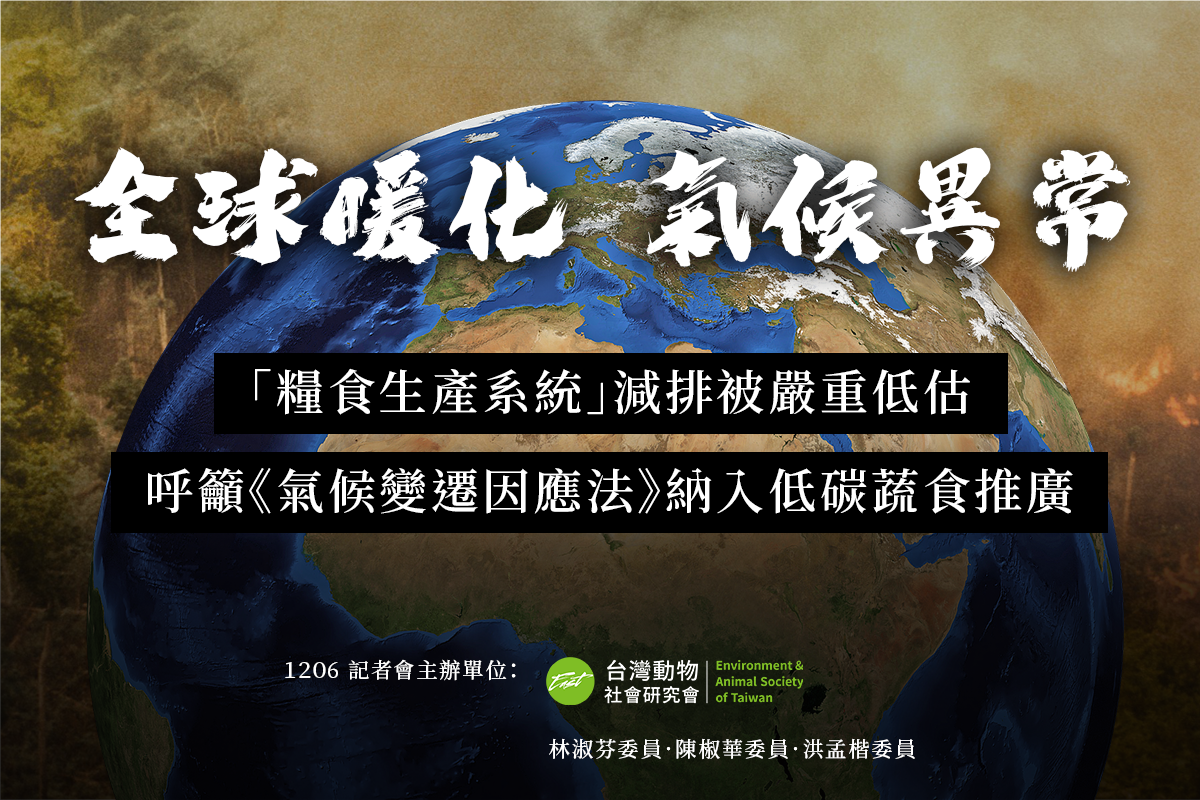Taiwan's climate legislation embraces plant-based eating

Taiwan's flagship climate bill has passed the legislature featuring new requirements for the Taiwanese government to promote low-carbon diets – with specific reference to plant-based foods. The bill passed the third reading on January 10.
Article 8 of the act tasks the Council of Agriculture with promoting low-carbon diets. The accompanying legislative explanation – which spells out legislators’ intentions – describes low-carbon diets as including plant-based foods, in addition to locally-produced foods and food waste reduction (see Appendix 1).
Article 42 requires all levels of government to promote low-carbon diets as a means of climate change mitigation and adaptation, among other measures. The article also calls on governments to support civil society organizations carrying out relevant activities (see Appendix 2).
The overhauled Climate Change Response Act enshrines Taiwan’s 2050 net zero target into law and requires central and local government agencies to implement emissions reductions plans, under the coordination of the National Council for Sustainable Development. Taiwan is believed to be one of few countries with reference to plant-based eating in its climate change legislation.
Greenhouse gas emissions from the global food system account for one-third of anthropogenic greenhouse gas emissions[i], and the emissions from animal-based foods have been found to be twice those of plant-based foods.[ii] Since 2010, the United Nations Development Programme (UNEP) has highlighted the resource intensity of animal-based food products, while a 2022 Intergovernmental Panel on Climate Change report declared a shift to diets with a higher share of plant protein “could lead to substantial decreases in GHG emissions.” [iii]
In 2021, France passed a climate bill requiring school cafeterias to offer meat-free menus in school canteens at least once a week, with private sector caterers required to offer vegetarian menus by this year.
“As the world comes to grips with the importance of food systems in addressing climate change, we are delighted to see an emphasis on low-carbon diets in Taiwan’s climate legislation” said Wu Hung, chief executive of EAST.
“In light of this development we call on the Executive Yuan to re-visit its 2050 Net Zero Emissions Pathway and Strategy and take steps to address excessive meat consumption” he added.
EAST has been vigorously campaigning for Taiwan’s laws to recognize the important role food systems have to play in responding to catastrophic climate change.
On December 6, we held a press conference to demand Taiwan’s climate change laws promote meat reduction and plant-based diets to aid Taiwan’s transition to net zero. Together with the Green Citizens' Action Alliance and the Jane Goodall Institute Taiwan, we critiqued the government for failing to include the entire supply chain – such as land use change – and ignoring emissions from imported foods in its emissions calculations, leading to an underestimation of food system emissions.
The campaign to add plant-based eating to the climate bill generated widespread support, with more than 30 environmental, consumer and citizens groups including Wild at Heart Legal Defense Association, Taiwan Environmental Information Association and Taiwan Watch declaring their support for the provisions.
EAST has worked with supportive legislators including Hung Sun-han, Lin Shu-Fen (DPP), Chen Jiau-Hua (NPP), Hung Mong-Kai (KMT) and others to propose draft legislation, move amendments, and rally support across parties. The Democratic People’s Party, Kuomintang, New Power Party and Taiwan People’s Party all included low-carbon or meat-free eating in their proposed versions of the climate bill.
Media contact
Ting-Yu Chen, Researcher
Environment and Animal Society of Taiwan (EAST)
Mobile: +886 (9) 6011 1932
Office: +886 (2) 2236 9735
Appendix 1 – Article 8
The National Council for Sustainable Development shall coordinate, allocate, and integrate inter-agency climate change response matters relating to national fundamental principles and major policies to advance the climate change response and strengthen governance across domains.
…
10. The Council of Agriculture, Executive Yuan is in charge of agricultural greenhouse gas reduction management, low-carbon diet promotion, and ensuring food security.
Legislative explanation: “Low-carbon diets” means diets which minimize greenhouse gas emissions during production, packaging, transport and consumption, including plant-based or locally-produced foods and food waste reduction.
Appendix 2 – Article 42
All levels of government shall intensify work to educate and inform citizens, organizations, schools and industry about climate change mitigation and adaptation, and actively assist civil society organizations to implement relevant activities. The relevant matters are as follows:
…
8. Promote low-carbon diets, the use of local produce, and reduction of food waste.
Legislation text translated by EAST.
[i] United Nations Environment Programme (2022). Emissions Gap Report 2022: The Closing Window — Climate crisis calls for rapid transformation of societies. Nairobi. https://www.unep.org/emissions-gap-report-2022
[ii] Xu, X., Sharma, P., Shu, S. et al. Global greenhouse gas emissions from animal-based foods are twice those of plant-based foods. Nat Food 2, 724–732 (2021). https://doi.org/10.1038/s43016-021-00358-x.ep .
[iii] Intergovernmental Panel on Climate Change (2022). Climate Change 2022: Mitigation of Climate Change, pg. 111. https://www.ipcc.ch/report/ar6/wg3/downloads/report/IPCC_AR6_WGIII_FullReport.pdf










